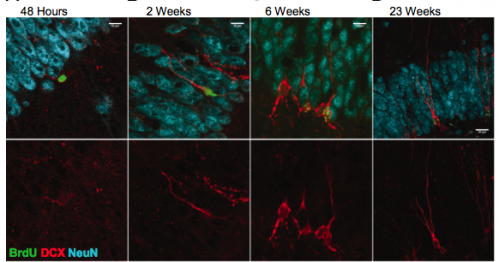![]() So, it turns out that neurogenesis in primates is quite a bit different than in rodents. It’s been over 10 years since adult neurogenesis was first described in the adult primate hippocampus and yet much of the basic work has yet to be done. That’s where this new study by Kohler et al. come in. The data are not so new actually — they were first presented at the Society for Neuroscience meeting back in 2005.
So, it turns out that neurogenesis in primates is quite a bit different than in rodents. It’s been over 10 years since adult neurogenesis was first described in the adult primate hippocampus and yet much of the basic work has yet to be done. That’s where this new study by Kohler et al. come in. The data are not so new actually — they were first presented at the Society for Neuroscience meeting back in 2005.
Their question was simple: at what rate do newborn neurons mature in nonhuman primates? Their methods were also simple and easy to compare to previous studies in rodents: they used BrdU to label newborn cells and then they colabeled the BrdU+ cells with immature (DCX) and mature (NeuN) neuronal markers at different cell ages: 2 days, 2 weeks, 6 weeks, 11 weeks and 23 weeks.
First, they found that after labeling with BrdU the number of BrdU+ cells increased over the next 6 weeks. This fits well with the data from Gould and suggests that precursor cells in primates may divide much more infrequently, taking up the BrdU label at injection, retaining it for several days or weeks and then giving rise to additional BrdU+ cells upon redivision, etc etc until the BrdU is diluted.

Second, the BrdU+ cells they observed appeared immature for much longer than is typically seen in rodents. Whereas in rodents ~90% of new cells express the immature neuronal marker DCX within a couple days of birth, peak DCX expression wasn’t observed until cells were 6 weeks old. By 23 weeks, ~40% of cells still expressed DCX (contrast with rodents, where DCX expression is gone by ~4 weeks) and only 40% expressed the neuronal marker NeuN, which may be because the cells were not fully mature. Interestingly, the lone human BrdU study reported similar proportions of cells expressing NeuN (22%), perhaps also reflecting extended maturation. In addition to marker expression, dendritic branching was very rudimentary in DCX+ neurons. Six week old cells typically only had a single dendritic branch. By 11 and 23 weeks, cells increasingly had higher order dendritic branch patterns.
This study is significant because it suggests that to truly understand the function of adult neurogenesis in primates (perhaps including humans), we have to adjust our understanding of the timing of the whole process. One example that is provided by the authors is the temporal link between antidepressant action and neuronal maturation. The fact that antidepressants take several weeks to become effective in humans roughly matches the timecourse of maturation of newborn neurons in rodents and this is often cited as evidence that neurogenesis contributes to the antidepressant response (i.e. antidepressants increase proliferation of new cells and after several weeks those cells are functional and can counteract depressive behavior). The authors may be right in a sense – it does suggest that the maturation process in primates may be too slow for increased proliferation to translate into functional neurons and improved behavior. However, it remains possible that antidepressants work by accelerating the maturation of older, immature neurons, which could still fit with this new prolonged timecourse. Regardless, when studying primates, we may have to wait longer after labeling new cells before we quantify them, to know how many mature neurons are added. We may have to wait longer to assess how experience affects synaptic or dendritic growth. We may have to wait longer after ablating neurogenesis before assessing behavior. We may have to wait longer before the next set of experiments can be completed and published…
Reference
Kohler SJ, Williams NI, Stanton GB, Cameron JL, & Greenough WT (2011). Maturation time of new granule cells in the dentate gyrus of adult macaque monkeys exceeds six months. Proceedings of the National Academy of Sciences of the United States of America PMID: 21646517
Great post! Very helpful as I was just looking around today to remind myself how long maturation takes in mice. I definitely think that if neurogenesis is a (a, not THE) mechanism of antidepressant action, it is not going to be as simple as: it’s because it increases the number of new neurons. I’m thinking maturation, integration are going to be very important on the mechanism.
Pingback: What I learned at while presenting at #SFN11 | Functional Neurogenesis